MyHeritage DNA review: The international alternative to AncestryDNA - martinbegroway
MyHeritage's DNA testing service may cost standardized to it of its older rival, AncestryDNA, just it differs in one important way: MyHeritage DNA has more users outside the United States of America. For Americans looking to connect with long-lost relatives across the Atlantic, that makes it a compelling option.
Yet, choosing MyHeritage Desoxyribonucleic acid over another service South Korean won't be a cut-and-dry decision. As unity of the newer companies doing DNA analysis, MyHeritage DNA has tested nowhere close the same amount of people as its proved rivals, and its database reflects that. Rightfield today, MyHeritage DNA has data for more than 2 million people, piece AncestryDNA's records stop Sir Thomas More than 10 million.
That numerate won't affect the accuracy of organism matched with relatives—MyHeritage DNA's test will be fitting as spot on as its bigger competitors so long American Samoa DNA from one of your relatives is in the database.
That's because MyHeritage Deoxyribonucleic acid is an autosomal DNA test, or the most unwashed examination for line of descent out there. It examines your autosomes, which are 22 of the 23 chromosome pairs you share with relatives on some sides of your families. Geneticists say autosomal chromosomes can accurately find relatives inside heptad generations, or roughly 210 long time from your birth. These tests are 90 percent dead on target when determination start and moment cousins, but lose truth as the telling grows more distant.
MyHeritage's database size does however meanspirited fewer prospective people to match with. Beyond that, the smaller amount of data also matters because the more DNA in the database, the more accurate these tests are at estimating genetic origins. That's not to say MyHeritage DNA is wide, but rather, large services like AncestryDNA and 23andMe have an vantage.
Note: This review is part of our unsurpassable Desoxyribonucleic acid test kit roundup . Go there for details about competing products and how we tested them.
DNA Collection
Instead of collecting your spit, MyHeritage DNA has two cheek swabs and vials you send off. Here's what's in the kit:
- Two cheek swabs
- Two vials filled with DNA preserving musical
- One shaping grip
- Bring back gasbag (not prepaid)
- Activation menu
- Instructions
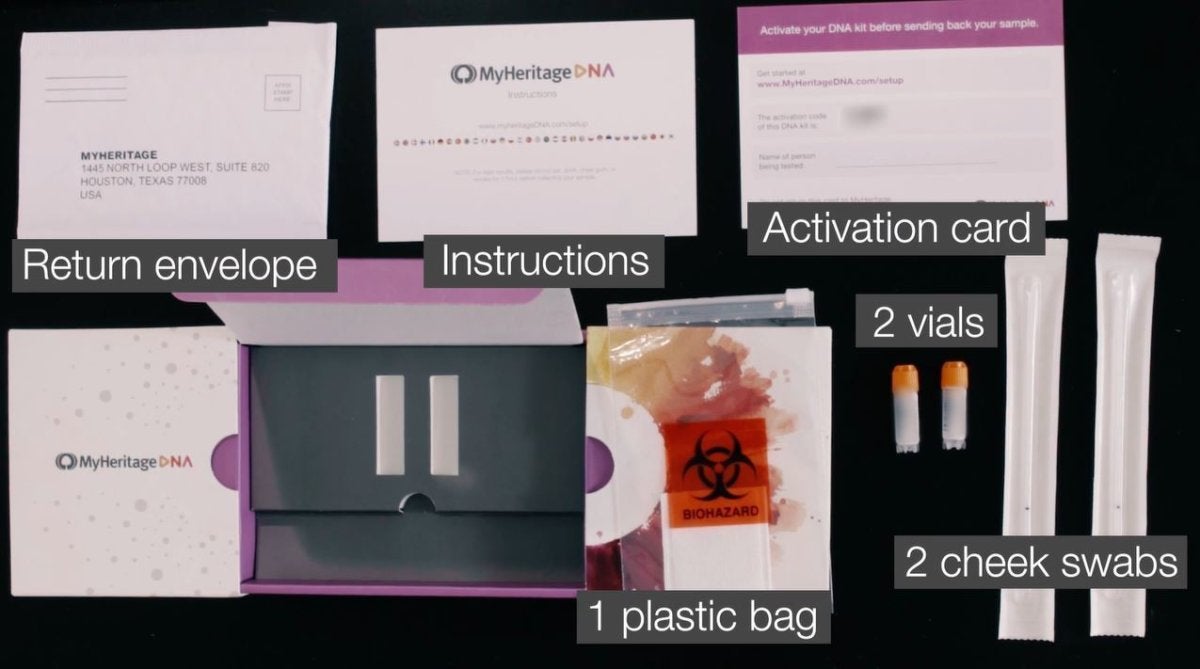 MyHeritage
MyHeritage This is what comes in the boxwood.
I personally prefer cheek swabs concluded spitting over and once again in a vial, so I found MyHeritage DNA's test far more fuss-free than AncestryDNA and 23andMe, which require saliva samples. Another benefit of the brass swab is that you can drink or eat within 30 transactions of taking it. With spit tests, you can't.
Generally, I was more impressed with MyHeritage's packaging and the ease of taking the examination than any of the others I took. Afterward you swab a cheek, you put the swab in a ampule and easily tear up it off on the black line.
After both vials are tightly closed, you then seal them up in the biological agent bag and place it in the rejoinder envelope. Unluckily, you'll need to concealment the postage to send your DNA sample bump off to the lab in Sam Houston, Texas. That's an extra price that you won't fund with services like AncestryDNA and 23andMe, which cover the shipping of their return mailers.
Also in the kit is the activation menu, which you'll necessitate to receive your results on MyHeritage's web site.
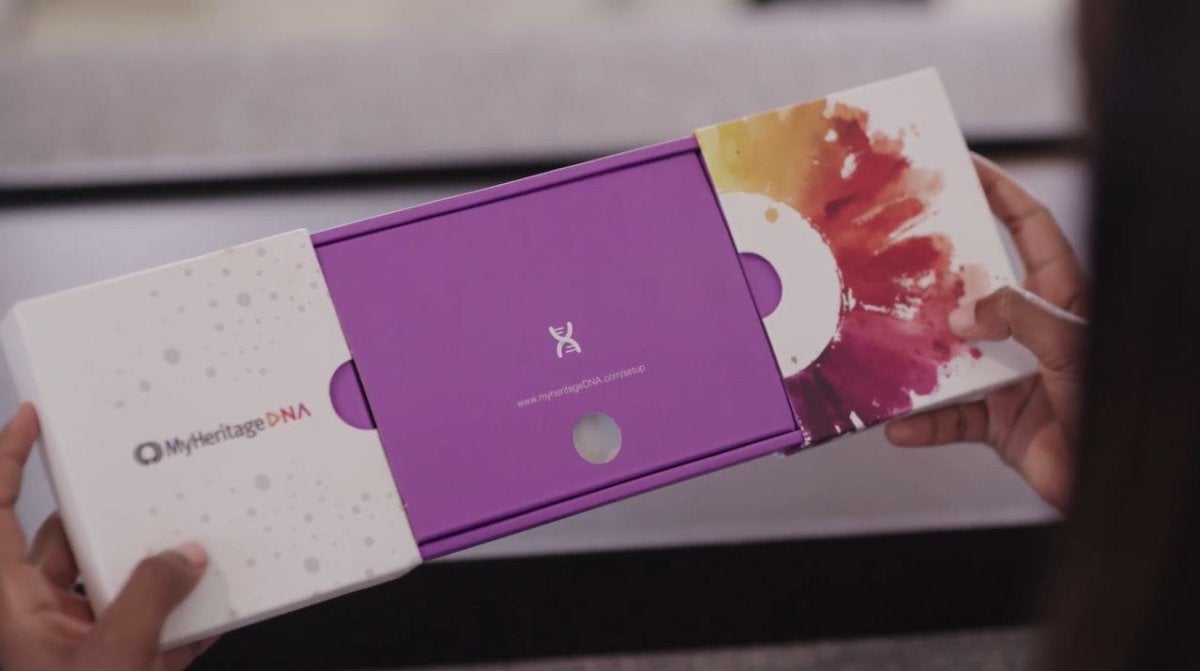 MyHeritage
MyHeritage MyHeritage Desoxyribonucleic acid's box pleasantly slides apart.
Speeding
MyHeritage has a turnaround of 4 to 6 weeks after the sample arrives at the research laboratory. That's faster than competitors AncestryDNA and 23andMe, which require 6 to 8 weeks, and notably quicker than LivingDNA's 10 to 12 weeks and Helix's 8 weeks.
Results
The first part of MyHeritage's results is a slip animated "intro" TV that lists all your estimated ethnicities. Aft it finishes, you're presented with the sounding map screening your ethnic regions. This map is pretty canonic and doesn't stimulate any interactivity, different AncestryDNA's.
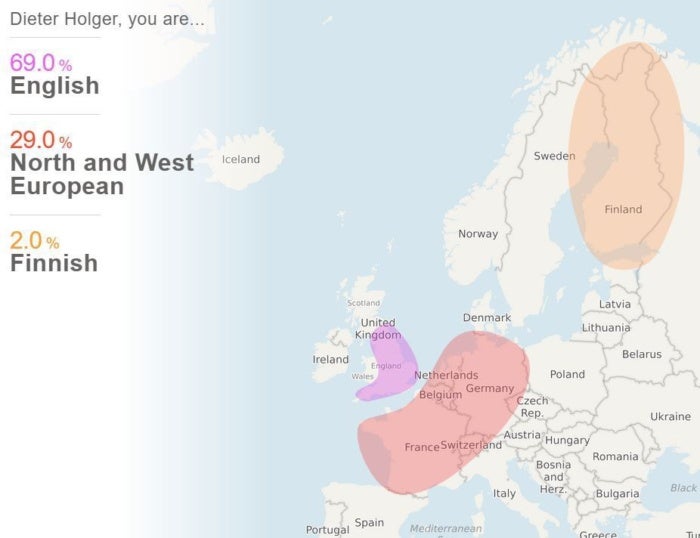 Dieter Holger/IDG
Dieter Holger/IDG MyHeritage's ethnicity estimate represent.
However, a smaller, interactive map is disposable when you aspect your Ethnicity Estimate under your account dashboard. This split set of maps is uncomprehensible, as same banging interactive one would be much clearer and easier to reference.
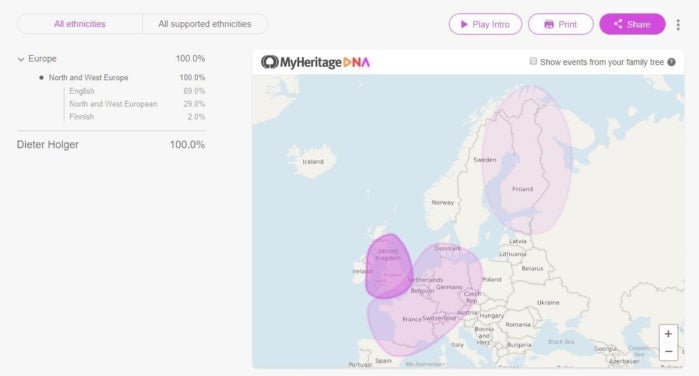 Dieter Holger/IDG
Dieter Holger/IDG MyHeritage Desoxyribonucleic acid's smaller correspondenc.
MyHeritage's results dramatically diverged from the other tests I took, which had been for the most part in agreement with family history and records. MyHeritage said I was 69 percent English, which seems odd since my father is most surely from German and Swedish ancestry and we aren't redolent of any English on his root.
In contrast, AncestryDNA pegged me at only 26 pct British, 34 per centum West European, and 21 per centum Scandinavian. 23andMe gave similar results as AncestryDNA. These breakdowns are in product line with my kinsfolk records and history.
MyHeritage too only identified three ethnic groups for me: Island (69 percent), Northeasterly and West European (29 percent), and Finnish (2 percent). Those results appear overly simplified when compared to the other tests I've usurped. AncestryDNA, for example, divided me into four ethnicities and tetrad Low assurance ethnicities, totaling viii different cultures.
MyHeritage says that DNA tests taken by the synoptic person can result in "somewhat different processing" attributable small differences of "chemical nature" you said it algorithms are semi-processed.
In opposite quarrel, not all tests bequeath yield the same results because of their methodology. It's bewildering why the difference exists, but the lower accuracy when compared to the two largest DNA examination services makes MyHeritage a less appealing option. My mother happened to also take the MyHeritage DNA test, and her results listed multiple ethnicities with high percentages that never listed in my profile.
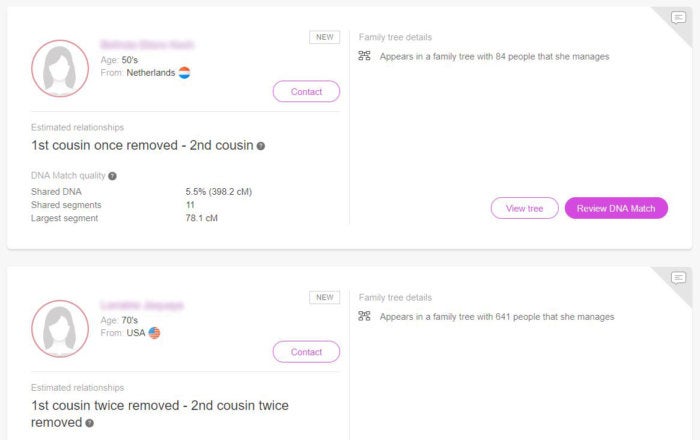 Dieter Holger/IDG
Dieter Holger/IDG You can review a leaning of your DNA matches through the site.
One of MyHeritage's primal services is matching you with relatives. The results divide your pairings into three categories: airless family, extended family, and aloof relatives. According to MyHeritage, I sustain thousands of distant relatives in its database, but only deuce people who are close or extensive family. Neither person nor their last names rang any bells.
Clicking on Review DNA Equalize with a relative, however, shows what you hold out in common. You'll realize what percentage of shared DNA you have with this person, arsenic well as a list of ancestral surnames that this person has. Lo and behold, one of these close relatives had a finale distinguish from my German side! (Admittedly, it's a very common family name.)
 Dieter Holger/IDG
Dieter Holger/IDG MyHeritage lets you liken your Desoxyribonucleic acid to matches.
Unmatchable matter MyHeritage does nicely is how it lists the number of relatives you have by their ethnicity. It also provides yet another mapping that shows you where most of your Desoxyribonucleic acid matches live.
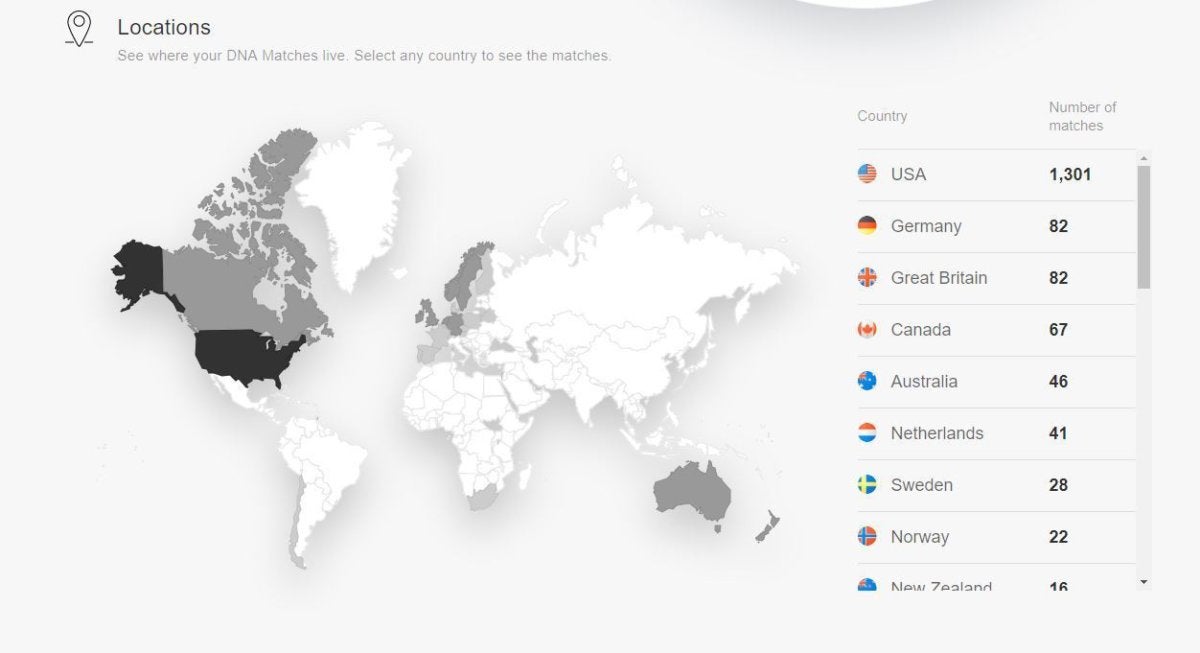 Dieter Holger/IDG
Dieter Holger/IDG The correspondenc of where your DNA matches viable.
The number's accuracy could use improvement, though. For instance, it said I had 1,134 DNA matches who were Irish, Scottish, and Welsh, but that my DNA was 0 percent from this group. I also apparently had 1,120 Desoxyribonucleic acid matches WHO were English piece existence 69 per centum from this group.
My test results from MyHeritage's competitor, AncestryDNA, did nam ME as 4 percent Irish people, Scottish, and Welsh, which lends acceptance to me having distant relations there. But MyHeritage's contradictory way of presenting this especial subset of results leads Maine to dubiousness the overall information encourage.
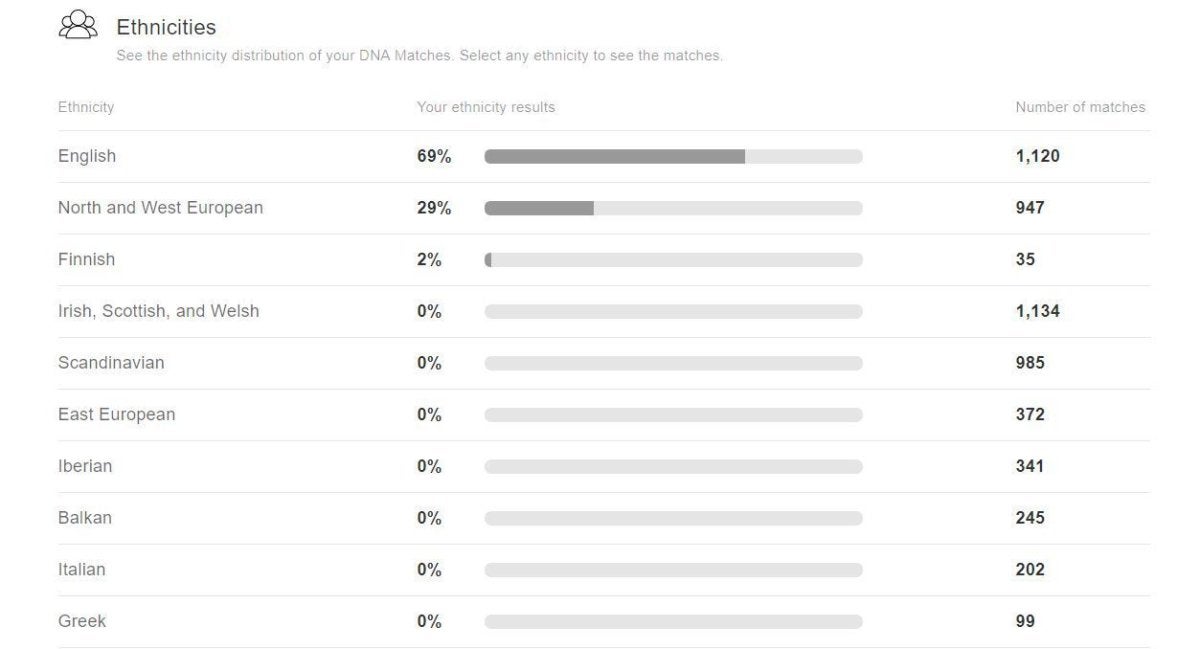 Dieter Holger/IDG
Dieter Holger/IDG MyHeritage breaks down the ethnicities of your DNA matches.
Missing from MyHeritage's results is information on your ancient origin and the migration patterns of ancestors from thousands of years agone. LivingDNA, 23andMe, GPS Origins, and Helix do provide this information, which they determine by testing your yDNA from your father and mtDNA from your mother to match your Deoxyribonucleic acid with genes shared by haplogroups. This allows them to place a democratic antecedent that a group of hoi polloi descended from tens of thousands of age ago.
Privacy
A MyHeritage spokesperson says that to protect your DNA data, the company employs "multiple layers of sophisticated encryption," and are certified by the FDA and College of American Pathologists for handling DNA information.
That explanation is not as crystal clear as it could represent, as rivals have shared their data encryption policies more expressly. Living DNA, for example, says it uses AES-256 to protect user data.
MyHeritage's privacy policy also states that they do not have ownership of your DNA, and it likewise gives you command of terminated what information you have displayed on your profile. For instance, if you want to conceal your profile from unusual users altogether, you tooshie do this in My Privacy under Account Settings.
The My Privacy page is refreshingly simple to use. You're presented with a range of tick boxes, which are mechanically all ticked, that allow you control over various privateness settings (e.g, allowing comments on your profile, letting users download shared DNA segments information, etc.) In My Seclusion, you can then go to Desoxyribonucleic acid Preferences to decide if you want DNA matches to be able to see you, aspect your ethnicity reckon, or view operating room compare your divided up DNA.
There are also two accept agreements under DNA Preferences you lav take from at any time. Although MyHeritage doesn't share any data with separate companies, IT does use your information for its own scientific research. If you Don't feel comfortable with this, upright untick the boxes to opt-out. You're besides tending the choice to prefer-in to these agreements when you registry for your account.
Prize
MyHeritage's DNA test kit retails for $79, but often has sales and promotions which bring the price set to $59. Flush at its full retail price, MyHeritage is $20 cheaper than AncestryDNA, 23andMe, and Living DNA. The only downside is that you have to pick over up the postage, but that shouldn't cost much than $10 max.
Like Ancestry, you'll pauperism to pay an extra bung ($13.27 a month) to get ahead access to MyHeritage's large ingathering of genealogical records culled from historical and government documents. But the Deoxyribonucleic acid matching serving you set out from the matchless-off payment works healed plenty on its own.
Editor's banknote: Because online services are often iterative, gaining new features and performance improvements over metre, this survey is theme to change in say to accurately reflect the current State of the service. Any changes to school tex or our final review verdict will be celebrated at the top of this clause.
Source: https://www.pcworld.com/article/402897/myheritage-dna-review.html
Posted by: martinbegroway.blogspot.com


0 Response to "MyHeritage DNA review: The international alternative to AncestryDNA - martinbegroway"
Post a Comment